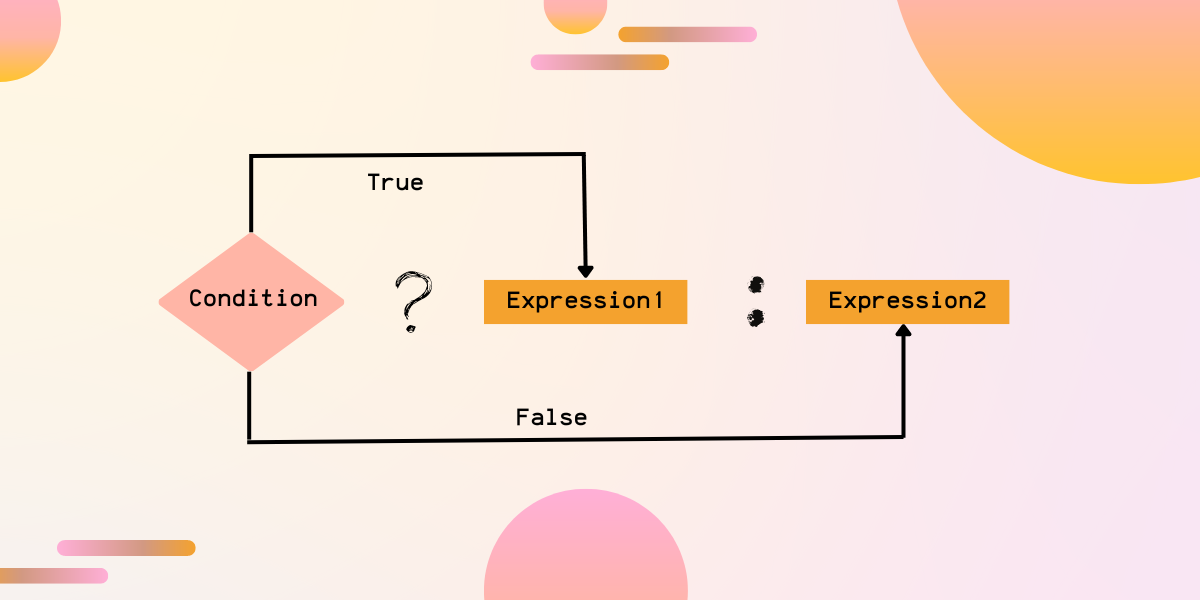
Ternary operator in C++: Advantages, Use Cases and Which is Better?
Introduction to Ternary Operation in C++
For writing efficient and concise code in C++, the ternary operator is a powerful tool that every programmer should know. Although it may seem tricky at first, mastering the ternary operator can improve your coding skills and make your code cleaner and easier to read. In this blog, we’ll dive into the ternary operator, covering its syntax, common use cases, benefits, and best practices. By the end, you’ll have the skills to use the ternary operator effectively, boosting your C++ code’s efficiency and readability.
What is Ternary Operator in C++?
The ternary operator in C++ is a shorthand conditional operator that provides a concise way to write simple if-else statements. Its syntax is as follows:
condition ? expression1 : expression2;The ‘condition‘ is a Boolean expression that evaluates to either true or false.
If the ‘condition‘ is true, the ternary operator returns ‘expression1‘.
If the ‘condition‘ is false, the ternary operator returns ‘expression2‘.
Advantages of the Ternary Operator in C++
- Concise Code: The ternary operator allows you to express simple conditions in a single line, reducing the need for lengthy if-else blocks and making your code more compact.
- Readability: When used judiciously, the ternary operator can enhance code readability, as it provides a clear and direct way to express conditional logic.
- Performance: In certain situations, the ternary operator can lead to better performance than using traditional if-else statements, as it reduces the need for branching.
Common Use Cases of Ternary Operator in C++
Assigning Values: You can use the ternary operator to assign different values to a variable based on a condition. For example:
int x = (condition) ? value_if_true : value_if_false;- Replacing if-else statements: Instead of writing lengthy if-else blocks for simple conditions, you can use the ternary operator to achieve the same result in a more concise manner.
Null Checks and Default Values: The ternary operator is handy for providing default values or handling null conditions. For instance:
int result = (ptr != nullptr) ? *ptr : default_value;
Ternary Operator vs. If-Else: Which is Faster?
When writing C++ code, you might wonder whether the ternary operator or the traditional if-else condition is faster. Both constructs are used to make decisions based on conditions, but they differ in syntax, readability, and, occasionally, performance. Let’s dive into the comparison to understand their differences and which one might be faster in certain scenarios.
1. Syntax and Readability
Ternary Operator:
The ternary operator is concise, using thecondition ? true_value : false_valueformat. It is ideal for short, simple decisions where readability is not compromised.int max = (a > b) ? a : b;If-Else Condition:
The if-else construct uses a more verbose syntax, making it easier to understand for complex conditions but less concise for simple assignments.int max; if (a > b) { max = a; } else { max = b; }
2. Performance
From a performance perspective, the ternary operator and if-else construct are usually equivalent in terms of execution speed because modern compilers optimize both constructs effectively. The compiled code for a simple ternary operation and an equivalent if-else block often looks identical in assembly language.
Ternary Operator:
The ternary operator can be faster in scenarios where it directly assigns a value without additional logic. For example:int result = (x > 0) ? x : -x;
This may compile into fewer instructions compared to an expanded if-else block.
- If-Else Condition:
In complex scenarios involving multiple statements, if-else can be more versatile and may generate slightly more instructions due to branching. However, the difference in execution speed is negligible for most practical applications.
3. When Ternary Operator May Be Faster
- Inline operations like assignments can leverage the ternary operator's concise syntax, potentially leading to marginally faster execution because it eliminates branching.
- It avoids the overhead of multiple lines of code in simple scenarios, enabling cleaner compiler optimizations.
4. When If-Else is Better
- For more complex logic that involves multiple steps or debugging, if-else provides better readability and maintainability.
- If-else is less prone to errors in cases where nested conditions are required, as excessive nesting with ternary operators can make the code harder to read and debug.
Best Practices to Use Ternary Operator in C++
- Keep It Simple: The ternary operator is designed for simple conditions. Avoid using complex expressions within the ternary operator, as it can lead to reduced code readability.
- Use Parentheses for Clarity: To prevent ambiguity, always use parentheses to enclose the entire ternary expression, especially when using it in complex assignments or in conjunction with other operators.
- Avoid Nesting: Refrain from nesting multiple ternary operators within one another, as it can quickly become difficult to understand and maintain.
Summary
The ternary operator in C++ is a powerful and flexible tool that lets you write shorter, more readable code. By learning its syntax, benefits, and best practices, you can use it effectively for handling simple conditions, assigning values, and boosting your code’s performance. However, as with any coding tool, it’s best to use the ternary operator carefully and only for straightforward cases. Adding the ternary operator to your C++ toolkit can help you become a more efficient and skilled programmer.